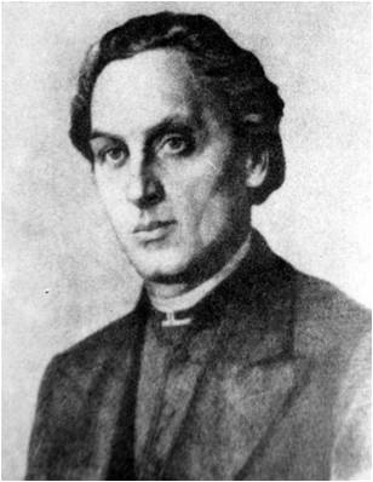Shashkevych, Markiian
Shashkevych, Markiian [Шашкевич, Маркіян; Šaškevyč, Markijan] (pseud: Ruslan), b 6 November 1811 in Pidlyssia, Zolochiv circle, Galicia, d 7 June 1843 in Novosilky Lisni, now in Busk raion, Lviv oblast. Poet and leader of the literary revival in Western Ukraine based on the vernacular; father of Volodymyr Shashkevych. He graduated from the Greek Catholic Theological Seminary in Lviv in 1838 and worked as a priest in the rural Lviv region. During his studies he met Yakiv Holovatsky and Ivan Vahylevych, with whom he formed the Ruthenian Triad. He also organized nationally conscious Ukrainian young people (Hryhorii Ilkevych, I. Bilynsky, F. Minchakevych, M. Kozlovsky, Yu. Velychkovsky, and others) to work for national and cultural revival in Western Ukrainian lands, particularly to reintroduce the use of spoken Ukrainian language in writing and sermons. Their efforts resulted in the preparation of collections of folklore, Syn Rusy (Son of Rus’, 1833) and Zoria (The Star, 1834), and the publication of the almanac Rusalka Dnistrovaia (1836). The almanac had a decisive effect on the revival and development of Ukrainian literature in Galicia.
Shashkevych's first published poem appeared in 1835. His literary canon, however, is fairly small. Apart from a few personal lyric verses, he largely wrote patriotic poems. In 1836, he published the brochure Azbuka i Abecadlo (The Alphabet and the Abecedarium), written against attempts to Latinize the Ukrainian alphabet. He relayed into spoken Ukrainian selections of Slovo o polku Ihorevi (The Tale of Ihor's Campaign) and translated the New Testament into the vernacular (1842). His Chytanka dlia malykh ditei (Reader for Small Children, 1850) was published posthumously by Yakiv Holovatsky.
His fame as a reviver of national consciousness and initiator of a new Ukrainian literature in Galicia began growing after his death. In 1911 a large celebration of the centenary of his birth was staged, and a monument was erected in his memory on Bila Hora (near Pidlyssia). In 1959 a literary memorial museum was opened in Pidlyssia. In the 1970s–80s Shashkevych was invoked in reaction to the Russification of Ukraine and the assimilation of Ukrainians in the diaspora. The Shashkevych Institute was established in 1961 in Winnipeg; it publishes the periodical Shashkevychiiana (edited by Michael Marunchak).
BIBLIOGRAPHY
Tershakovets’, M. ‘Do zhyttiepysu Markiiana Shashkevycha z dodatkom: Materiialy, dokumenty...,’ ZNTSh, 105–6 (1906)
Lepkyi, B. Markiian Shashkevych (Kolomyia 1912)
Popovych, D. Markiian Shashkevych na tli vidrodzhennia Halyts’koï Ukraïny (1943)
Bilets’kyi, O. Slovo pro Markiiana Shashkevycha (Lviv 1961)
Shakh, S. Markiian Shashkevych i halyts’ke vidrodzhennia (Paris–Munich 1961)
Lutsiv, L. Markiian Shashkevych (Jersey City 1962)
Marunchak, M. Markiian Shashkevych na tli doby (Winnipeg 1962)
Shalata, M. Markiian Shashkevych: zhyttia i tvorchist’ i hromads’ka diial’nist’ (Kyiv 1969)
Marunchak, M. (ed and comp). Markiian Shashkevych: Bio-bibliohrafichnyi pokazhchyk (Winnipeg 1989)
Rozumnyi, Iaroslav, ed. Markiian Shashkevych na zakhodi (Winnipeg 2007)
Michael Marunchak
[This article originally appeared in the Encyclopedia of Ukraine, vol. 4 (1993).]

